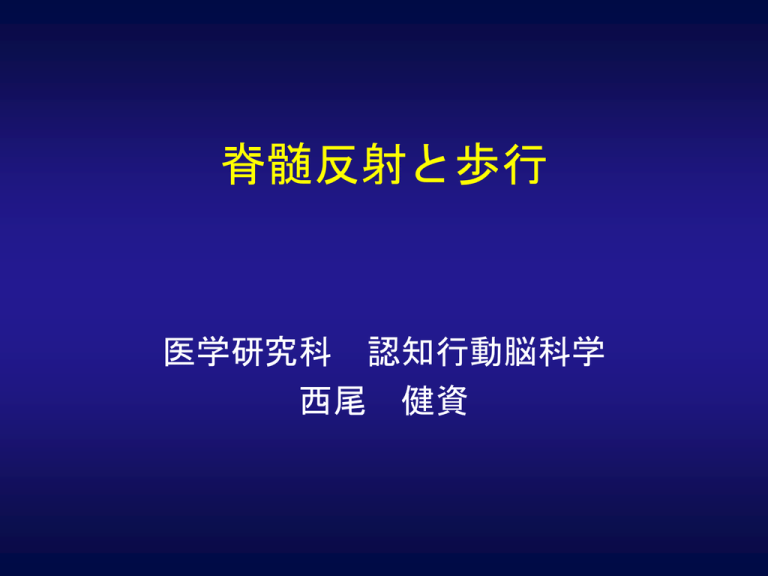脊髄反射と歩行 - Shiketai of Legend --
advertisement

脊髄反射と歩行 医学研究科 認知行動脳科学 西尾 健資 Spinal Reflexって何 ? 君たちはこんな時、どうしているだろうか? • 歩いていて、知らないうちに釘を踏んだ時 – これは何だろう?ああ釘か?だったら痛いんとちゃうか?と考えてから足を引っ込める。 – (何も考える間もなく)足を引っ込める。 • ストーブに手を触れた時 – ああ手が熱いなー、手を離さないとやけどするなーと考えてから手を引っ込める。 – (何も考える間もなく)手を引っ込める。 • 電車に乗っていて急に車体が揺れた時 – ああ体勢を立て直さないと体が倒れるーと考えてから体勢を立て直す。 – (何も考える間もなく)体勢を立て直す。 このように日常生活の場で、意識に上らない内に我々は外界の変化に対して 対応している。 この仕組みについて考えてみよう。 What is “reflex”? ‘re’-flex 直進 語源的には、re(後方に)-flex(曲がる) 行ったものが、また戻ってくる事を意味する What is a “reflex” in the nervous system? afferent 感覚情報 神経系 運動出力 efferent 神経系における”reflex”とは、求心性の感覚情報に対して stereotypeな遠心反応がおこること。 Motor System Organization efferent Reflex afferent The Stretch Reflex Stretch Reflex • Spinal Reflexの中で最も基本的な反射である。 • 筋肉が伸張された時、その伸張された筋肉を収縮 させる反応が起こる。 • この反射は、単シナプス反射であるが、出力であ る筋収縮の強さは、筋伸張のスピードや強さ、さ らに上位中枢からの調節により変化する。 • この仕組みについて考えてみよう。 Stretch Reflex(伸張反射) (deep tendon reflex) 打腱器で膝蓋をたたくと、四頭筋が伸張され、 脊髄反射を介して伸張された四頭筋が収縮する Muscles Contain Specialized Receptors That Sense Different Features of the State of the Muscle Muscle spindles: 筋線維と平列 Golgi tendon organs: 筋線維と直列 Functional Difference Between Spindles and Tendon Organs Derive from Their Different Anatomical Arrangements within Muscle Golgi Tendon Organs Are Sensitive to Changes in Tension 筋繊維の収縮 GTOの伸張 Ib 求心線維の発火 Muscle Spindles Respond to Stretch of Specialized Muscle Fibers The Primary and Secondary Endings of Spindle Afferents Respond Differently to Phasic Changes in Length Primary ending=Ia=dynamicを含む 長さの変化に比例して発火 Secondary ending=II=staticのみ 絶対的な長さに比例して発火 Firing of Ia fiber Two Types of Gamma Motor Neurons Alter the Responsiveness of Spindles Firing of Ia fiber Static gamma発火→ 核鎖線維収縮→ 核鎖線維感受性上昇→ Ia fiber 静的反応発火頻度上昇 動的反応発火頻度不変 Dynamic gamma発火→ 動的核袋線維収縮→ 動的核袋線維感受性上昇→ Ia fiber 静的反応発火頻度不変 動的反応発火頻度上昇 The fusimotor System Maintains Spindle Sensitivity During Muscle Contraction a-g 連関により、 随意運動中でも 筋長の変化を検 知でき、時々 刻々の変化に対 応できる。 a-g coactivation (a-g linkage) Fusimotor Output Can Be Adjusted Independently of Motor Output g activity Discharge of Muscle Spindle Afferents Produces Stretch Reflex Stretch reflexes contribute to muscle tone • Muscle tone とは? – 筋が伸張されるときにかかる抵抗に比例 – 筋の伸張されにくさ • Normal muscle toneの意義 – muscle toneは、筋をバネにする – エネルギーを蓄え、後で放出する – 運動を平滑にする • もしも筋トーヌスがなかったら、ロボットのよう に運動開始と終始が突然であったり、逆にゴム人 間ルフィーのような過剰な動きになる。 Stretch Reflexes Regulate Muscle Tone Through Negative Feedback 筋紡錘は筋長を検知し、stretch reflexを経由して筋を収縮させ、筋緊 張状態(m. tone)を調節する。(negative feedback loop) 最終的な筋長は、筋紡錘の感度と脊髄運動神経への下降性入力 (興奮性・抑制性)の総和と筋負荷によって決まる。 Summary • static gamma activity → contraction of fusal muscle of static bag fiber → increased firing of Ia afferent → alpha motor nerve activity → muscle contraction → shortening of muscle length • このように static gamma activity は静止状態の筋長を調節している。 • static gamma activity亢進 → 筋長短縮(筋緊張亢進) • static gamma activity低下 → 筋長延長(筋緊張低下) • dynamic gamma activity → contraction of fusal muscle of dynamic bag fiber → increased sensitivity of dynamic bag fiber • このように dynamic gamma activity はdynamic bag fiberの感受性を調節す ることによって、筋伸張反射の強さを調節する。 • dynamic gamma activity亢進 → 筋伸張反射亢進 • dynamic gamma activity低下 → 筋伸張反射低下 Spinal Mechanisms of Motor Coordination 脊髄における脊髄反射を含めた運動 の調節機構 Group Ia Inhibitory Interneurons Coordinate Opposing Muscles (Reciprocal Inhibition) Reciprocal inhibition is useful not only in stretch reflex, but also in voluntary movements because it enhances speed and efficiency during voluntary movements. Inhibition of the reciprocal inhibition causes co-contraction of opposing muscles, which is useful in joint stabilization. Renshaw Cells Are Part of a Negative Feedback Loop to Motor Neurons (Recurrent Inhibition) Renshaw cells regulate the firing rate of the spinal motor neurons. Group Ib Inhibitory Interneurons Receive Convergent Input from Several Types of Receptors Ib inhibitory interneurons receive convergent input from tendon organs, Ia afferents from muscle spindles, low-threshold cutaneous afferents, joint afferents and various descending pathways. They provide a spinal mechanism for the fine control of exploratory movements, such as active touch. Flexion Reflex Pathways Coordinate Whole Limb Movements Flexion Withdrawal Reflex Certain Reflexes Consist of Rhythmic Movements Scratch Reflex in a Spinal Dog cutaneous stimulus Spinal Circuits Generate Rhythmic Locomotor Patterns Spinal catにおいて 尻尾を持ち上げて体重を支 えてやると 両下肢を交互に動かす歩 行様の運動を遂行できる Central Pattern Generator Interneurons Are the Building Blocks of Spinal Reflexes Convergent and Divergent Connections Are the Basis of Reflex Pathways. Networks of Interneurons Coordinate the Timing of Reflex Components. 脊髄反射と歩行 • 歩行は、下肢の屈筋群と伸筋群を交互 に収縮させる一連の運動である。 • この一連の運動は、脊髄内にあるCPG と呼ばれる神経ネットワークに組み込 まれている。 • CPGの上位は脳幹であり、下位は脊髄 反射である。 Stretch Reflex and Sports • How stretch reflexes are involved in the voluntary movements? – Imagine the start of a sprinter who strongly kicks a board. – Imagine a Karate player who makes a thrust or a kick. – Imagine a swimmer who kicks the water Concluding Remark • You have known how the spinal cord is organized in the central nervous system and how it works in movements. Sherringtonの実験(stretch reflex) • 除脳猫(decerebrate cat)の作製 – 除脳固縮(decerebrate rigidity)。四肢伸展位で固まる。 • 伸展肢を他動的に屈曲しようと試みた – 伸張される筋に強い収縮を認めた。 – Stretch reflexと名付けた。 • Phasic contraction (brisk and short-lasting) triggered by the dynamic change in muscle length • Tonic contraction (weaker and longer-lasting) determined by the static stretching of the muscle at the new longer length • 除脳動物と正常動物におけるstretch reflexの比較 – 除脳動物:脳幹は伸張反射を強く促通する。 tonic reflexもある。 – 正常動物:高位中枢由来の下降線維は、状況に応じて伸張反射を促 通または抑制する。 正常動物ではtonic stretch reflexは誘発されない。 シナプス入力の時間的空間的加算 脊髄運動神経には多くの線維が投射している Cutaneous Stimuli Modulate the Excitability of Specific Motor Neuron Pools